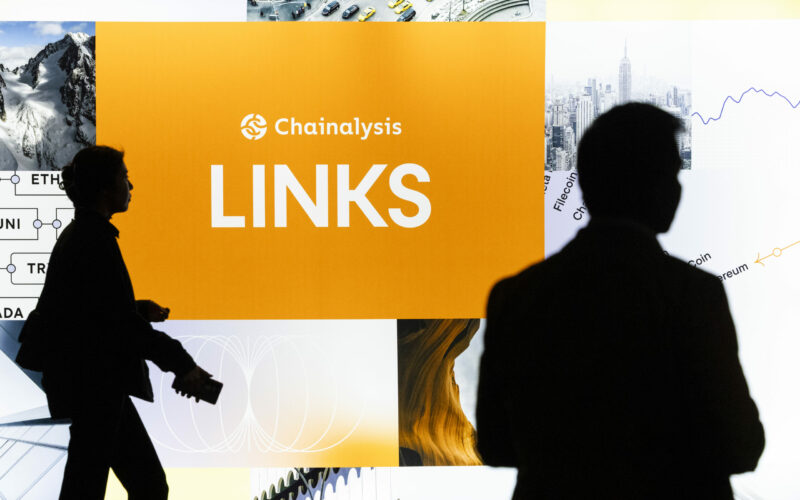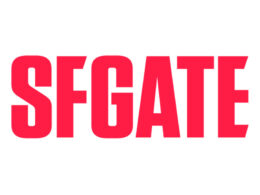Momentum was the theme of the day at Day 2 of Links NYC 2025. Leaders from across the private and public sectors — including TradFi, law enforcement, innovators, and disruptors — came together to discuss the changing realities of crypto. The day’s conversations revolved around cutting-edge technologies like AI and machine-learning, regulatory progress, hard-won lessons from headline-making cases, tokenization at scale, the rise of stablecoins, and bold new models for collaboration.
What transpired was a portrait of a rapidly maturing industry — one that’s leaning into transparency, doubling down on collaboration, and embracing innovation not as a buzzword, but rather as a blueprint for the future.
Chainalysis CEO Jonathan Levin in conversation with Tether CEO Paolo Ardoino
Opening the second day of Links, Chainalysis CEO Jonathan Levin sat down with Tether CEO Paolo Ardoino to discuss the evolving role of stablecoins in the global financial system, particularly in emerging markets. Ardoino detailed Tether’s expansive global compliance efforts, including partnerships with over 230 law enforcement agencies across 50 countries. “I don’t know any other financial institution that is so connected,” he said, highlighting the company’s use of Chainalysis and other tools to monitor both primary and secondary markets for illicit activity. Tether has taken a proactive role in identifying threats and seizing criminal proceeds, including support for a recent DOJ seizure of funds linked to Hamas. “We’re not just waiting — we’re the ones notifying law enforcement,” Ardoino emphasized.
He also spoke of the transparency advantages of blockchain: “You cannot change history… all finance has to move to this layer.” Looking ahead, Ardoino described the company’s dual strategy for domestic and international markets, signaling interest in launching a U.S.-focused stablecoin while continuing to expand in underserved regions. “There’s no one-size-fits-all product,” he said.
“We’re reinforcing the U.S. dollar’s role globally — and we’re ready for responsible oversight.” — Paolo Ardoino, Tether CEO
Harnessing AI for a safer future
Leaders from the public and private sectors explored how artificial intelligence is reshaping security, compliance, and investigations. Moderated by Chainalysis’ Danielle Davis, the conversation featured insights from Chainalysis Chief Scientist Jacob Illum, Principal Product Manager John Liu (AWS), and Deputy Assistant Director Darren McCormack (Homeland Security Investigations, HSI). The panelists emphasized that AI won’t replace humans, but will instead redefine their roles. McCormack detailed how HSI is using AI to identify victims of child exploitation and reduce the psychological burden on investigators. Liu shared how AI is making crypto onboarding as seamless as a credit card swipe, while Illum emphasized AI’s potential to democratize crypto knowledge and investigations: “AI needs to be your partner — not your crutch,” he said. While opportunities abound, challenges remain in areas like data management, observability, and cost. The panel called for responsible adoption, with McCormack highlighting AI’s potential to “make investigations more impactful” and to close the gap between criminal actors and law enforcement.
“AI isn’t coming for your job, it’s coming to your job.” — Jacob Illum, Chainalysis Chief Scientist
Building capacity to combat crypto crime: Chainalysis x City of London Police
Chainalysis’ Alex Cable sat down with Andrew Gould of the City of London Police. Gould shared how the UK is building a national policing strategy to combat crypto-related crime. Gould traced his journey from the UK’s first crypto seizure in 2015: “We didn’t even know where to store it” — to the development of a nationwide cybercrime response. Today, City of London Police works with over 43 forces to deliver consistent, high-quality capabilities across the UK. A cornerstone of this strategy is deepening public-private collaboration: “We’ve moved from using tools to co-developing operations,” said Gould. He described a new pilot program in which Chainalysis and other partners respond directly to law enforcement intelligence requirements, helping to identify actors, trace funds, and seize assets. “This isn’t just about enforcement — it’s about identifying threats and recovering public money,” he emphasized. Recent operations have already uncovered tens of millions in assets linked to historic dark net activity. Gould stressed the importance of legislative support, funding, and equitable access to tools across local and national levels.
“We have to democratize access to these capabilities — because although the crime is global, its impact is always felt locally.” -Andrew Gould, City of London Police
Major exchanges usher in a new era of crypto compliance
Compliance professionals from Coinbase, Kraken, and OKX spoke with Chainalysis Head of Compliance Caitlin Barnett to explore how crypto firms are navigating a rapidly evolving regulatory environment while scaling responsibly. “Innovation and compliance shouldn’t be a compromise,” said Vanessa Zhang of OKX, likening compliance to “mission control” — a constant, proactive partner in safe product launches. Melissa Strait of Coinbase highlighted blockchain analytics as crypto’s “superpower” in engaging regulators and building trust: “None of us want bad actors in the ecosystem.” CJ Rinaldi of Kraken emphasized the strategic importance of compliance: “Good compliance leads to customer trust, business success, and regulatory certainty.”
All agreed on the need for scalable, data-driven programs, strong local compliance teams, and early integration with product development. With global operations and increasing demand for on-chain financial tools, the panel emphasized compliance as not just a necessity — but a competitive edge.
“We’re not just responding to rules — we’re helping shape them.” — Melissa Strait, Chief Compliance Officer at Coinbase
Talking Solana’s Future with President Lily Liu
In a candid fireside chat, Solana Foundation President Lily Liu joined Chainalysis VP of Product Emmanuel Marot to unpack Solana’s evolution, its unique position in the blockchain ecosystem, and the broader vision of on-chain financial infrastructure. “We’re kind of the everything chain,” Liu said, referencing Solana’s flexibility across gaming, DeFi, stablecoins, and real-world assets (RWAs). She emphasized that Solana’s mission is to complement Bitcoin’s vision — not by being a store of value, but by enabling a truly global peer-to-peer financial system. “Faster and cheaper is just the beginning of a ten-year journey,” she added, citing performance as a prerequisite for real-world usability.
The conversation explored assets as financial content and blockchains as infrastructure akin to the internet: open, inclusive, and 24/7. Liu highlighted stablecoins and tokenized equities as key use cases that unlock global liquidity and financial inclusion, particularly in emerging markets. “If you have internet [access], you should have a bank account,” she said. Looking ahead, Solana aims to be the best place for capital, with Liu predicting that private companies and equities will become the next wave of on-chain innovation.
Unraveling the FTX crises: Behind the scenes with the FBI and Alvarez & Marsal
FBI Acting Supervisory Special Agent Elizabeth Kudirka unpacked the rise and fall of FTX, calling it “the fastest case I’ve ever worked — crypto speed.” She detailed how FTX, once a $15 billion-per-day trading powerhouse with a glittering public image, collapsed in just days following a leaked balance sheet revealing Alameda Research’s overexposure to FTT tokens. Kudirka emphasized that FTX’s fraudulent use of a fiat on-ramp played a key role in the $9 billion misappropriation of customer funds, emphasizing that’s “what made this case as large as it is.” The case saw the seizure of over $1 billion in assets, including crypto, real estate, and even private jets. “They repaid Alameda’s loans with customer money,” she stated, adding that political donations, luxury property, and massive venture investments were all funded by user deposits. Kudirka related a victim story of a Ukrainian man who lost his family’s life savings in war time, speaking to the human toll of the fraud.
In conversation with Chainalysis Chief Operating Officer Sari Granat, Kumanan Ramanathan, Managing Director and Co-head of Crypto at Alvarez & Marsal, offered an insider’s view of the FTX collapse from the frontlines of the bankruptcy process. Detailing what he called “the most complex crypto restructuring in history,” Ramanathan emphasized the unprecedented scale of forensic recovery, including tracking over a million customer claims and locating billions in misappropriated assets. “What we found wasn’t just chaos — it was controlled chaos,” he noted, describing a company that lacked basic accounting systems and relied on “Slack messages and spreadsheets” to move funds. He praised the power of blockchain analytics in helping investigators trace funds in real time, saying, “Without on-chain transparency, this process would have taken years, not months.” Ramanathan also discussed how FTX’s collapse sparked broader conversations around governance, regulatory clarity, and operational discipline in crypto.
“The real legacy of FTX may be the guardrails it forces the industry to build.” — Kumanan Ramanathan, Managing Director and Co-head of Crypto at Alvarez & Marsa
TradFi leaders respond to shift in regulatory tone
A powerhouse panel of U.S. financial leaders from Fidelity, US Bank, State Street, and Lead Bank alongside Chainalysis’ Bryan Favero explored how the rescission of OCC Interpretive Letter 121 and a new U.S. administration are reshaping the regulatory landscape for digital asset custody and innovation in traditional finance. Panelists emphasized that the rescission removes a major barrier, unlocking previously stifled product development. “It robbed us of three years of innovation,” said Cynthia Jackson of US Bank. Erica Khalili of Lead Bank highlighted the shift toward “regulatory education over regulatory fear,” noting, “Why wouldn’t you want it in the banking system where you can oversee it?” The conversation also tackled systemic risk, “right-sized regulation,” and the need for “responsible innovation” as institutions balance speed with safety. “We’re in a moment where the executive branch, legislative branch, regulators, and institutional adoption are all aligning,” said Jackson, capturing the panel’s optimism for crypto’s future within traditional finance.
“We’ve moved from ‘this is scary’ to ‘this is innovation.'” — Erica Khalili, Chief Legal and Risk Officer and Co-founder, Lead Bank
Combatting IP theft and modern piracy on-chain
Digital piracy has gone pro. Chainalysis’ Scott Johnston sat down with Sky TV, the MPA, and Crypto ISAC, revealing how today’s piracy rings operate like startups — complete with customer service, sleek apps, and crypto payment rails. “This isn’t a guy with a camcorder anymore,” warned Sky’s Dom Stonebridge. From IPTV empires to “Piracy-as-a-Service” kits, criminals are raking in millions, with stablecoins now the preferred fuel. “At the top of the pyramid, it’s all crypto,” said Stonebridge. With losses topping $200 billion globally, investigators are fighting back using on-chain tools like Chainalysis’ Wallet Scan to expose networks and follow the money. “We’re not just chasing streams — we’re tracing wallets,” said MPA’s Bryan Willett.
The nexus of tax, technology, and crime
Tax crime is going high-tech. Roger Brown of Chainalysis, Pedro Franz of Brazil’s Receita Federal, and Sam Bawtree of the UK’s HMRC discussed how tax agencies are evolving into data powerhouses. “Every tax authority should operate like a tech company,” said Brown. Franz revealed a staggering $8 billion crypto-fueled fraud case uncovered via network analysis, while HMRC emphasized behavioral insights and the rise of “tech-enabled money laundering.” Both stressed the game-changing power of big data, blockchain forensics, and upcoming frameworks like CARF. From on-chain sleuthing to AI-powered red flags, HMRC and Receita Federal are blending behavioral insight, graph neural networks, and blockchain data to expose everything from laundering to Ponzi schemes.
“Crypto isn’t scary — it’s just data. Investigate it like anything else. And now we’ve got the tools.” Sam Bawtree, — HMRC UK
Tokenization: Scalability and success
Tokenization is no longer theoretical — it’s live, scalable, and actively transforming finance. Leaders from BNY Mellon, Franklin Templeton, and WisdomTree unpacked real-world deployments and the acceleration of digital assets. “We’re still in the early innings of where this could go,” said Franklin Templeton’s Ric Golubov, Vice President of Digital Assets highlighting how their tokenized money market fund on public blockchains unlocks 24/7 yield and peer-to-peer transfers. WisdomTree’s Meredith Hannon emphasized “programmability as a game changer,” Rajeev Sethi of BNY emphasized that tokenization boosts liquidity, resiliency, and global cash movement. With institutions moving beyond pilots to full-scale production.
“The shift is no longer what if — it’s what’s next.” — Rajeev Sethi, Managing Director and Head of Digital Cash at BNY Mellon
The road ahead is marked by progress and optimism
Crypto is no longer defined by speculation — it’s being defined by execution. Across sectors, the focus on blockchain has shifted from pilots to production, from experimentation to infrastructure. Whether it is emerging regulation, real-time law enforcement coordination, or the rapid adoption of tokenized RWAs, this is a space maturing at speed. And with that maturity comes responsibility — shared between the public and private sectors to make this new system safer, more inclusive, and built to power the financial rails of the world.
Thanks to all of our customers and partners who made the event a success, and a special thanks again to our sponsors for their support: AWS, BRG, Carahsoft, Cloudburst Technologies, Fireblocks, Guidehouse, Hummingbird, Microsoft, Notabene, SonarX, and Siren.
See you next year!
Missed out on attending Links or want to relive your favorite sessions?
The digital premiere of Links 2025 will replay a curated set of sessions. This free 2-hour experience will include CEO Jonathan Levin’s keynote on the state of the industry, an exclusive new session covering global policy developments, and our expert-led demos with real-world case studies covering investigations, compliance, data solutions, fraud prevention, and Web3 security. We’re hosting the virtual event multiple times to accommodate global time zones. Register for free and watch at your convenience.
This material is for informational purposes only, and is not intended to provide legal, tax, financial, or investment advice. Recipients should consult their own advisors before making these types of decisions. Chainalysis has no responsibility or liability for any decision made or any other acts or omissions in connection with Recipient’s use of this material.







